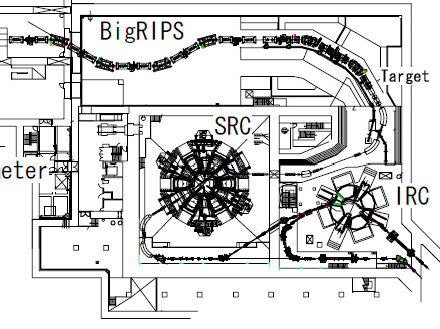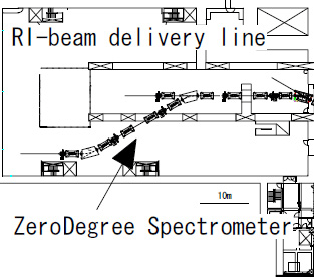| Facility Information |
| User Guide |
| PAC |
| Beam Time Operation |
| RIBF User Group |
| Collaboration |
| Seminars |
| Links |
| Archives |
|
BigRIPS
 |
||||
Configuration
BigRIPS Configuration

The BigRIPS separator has been designed to be a two-stage
RI beam separator. The first stage from the production target
to the F2 focus comprises a two-bend achromatic spectrometer,
consisting of four superconducting quadrupole triplets (STQ)
(STQ1 to STQ4) and two room-temperature dipoles (RTD) with
a bending angle of 30 degrees (D1 and D2). This first stage
serves to produce and separate RI beams. The in-flight fission
of uranium beams as well as the projectile fragmentation of
various heavy ion beams are employed as production reactions.
An achromatic wedge-shaped degrader is inserted at the momentum-dispersive
focus F1 at an intermediate point to make isotopic separation
based on the technique called momentum achromat. A high-power
beam dump is placed inside of the gap of the first dipole D1
to stop primary heavy ion beams. The first stage is surrounded
by thick concrete blocks of about 10,000 tons to shield neutron
radiation from the target and beam dump. A telescopic system
consisting of two STQs (STQ5 and STQ6) follows the achromatic
focus F2, transporting separated RI beams to the second stage.
The second stage from the F3 focus to the F7 focus consists
of eight STQs (STQ7 to STQ14) and four RTDs with a bending
angle of 30 degrees (D3 to D6), comprising a four-bend achromatic
spectrometer. The intermediate focuses F4, F5 and F6 are momentum-dispersive,
while the final focus F7 is doubly achromatic.
Since our energy domain is not so high, the purity of RI beams
is expected to be poor due to the nature of energy loss as
well as the mixture of charge state. Several isotopes are mixed
in an RI beam. To overcome this difficulty, the second stage
of BigRIPS separator is employed to identify RI-beam species.
Position-sensitive detectors, timing detectors and δ E detectors
are placed at the focuses of the second stage to measure the
Bρ value, the time-of-flight and the energy loss of RI beams.
The scheme allows one to determine the atomic number (Z), the
ratio of mass number to charge number (A/q) and the momentum
(P) in an event-by-event mode, making it possible to deliver
tagged RI beams to experimental setups placed downstream of
the BigRIPS separator. RI-beam experiments, particularly those
of secondary reaction studies, are significantly facilitated
by the delivery of tagged RI beams. The angular acceptances
of the BigRIPS separator have been designed to be 80 mr horizontally
and 100 mr vertically, while the momentum acceptance will be
6 %. The maximum bending power is 9 Tm. The total length is
77 m.
The angular and momentum spreads of fission fragments at 350
MeV/nucleon are estimated to be about 100 mr and 10 %, respectively,
when symmetric fission is assumed. The acceptances of BigRIPS
are comparable to those values, allowing one to achieve high
collection efficiency for the in-flight fission: almost half
of the produced fission fragments can be accepted for some
isotopes. These high acceptances are made possible by the use
of superconducting quadrupoles with large apertures and room-temperature
dipoles with large gaps.
BigRIPS seperator
 |
| Type | Seperate sector | ||||||||
| Separator config. | Tandem | ||||||||
| The first stage | TQ-D-TQ-TQ-D-TQ | ||||||||
| The second stage | TQ-D-TQ-TQ-D-TQ-TQ-D-TQ-TQ-D-TQ | ||||||||
| Degrader type | Wedge, @F1, F5, F4, F6 | ||||||||
| Magnet type | Dipole : Normal conducting Quadrupole : Super conducting |
||||||||
| Angular acceptance | Horizontal : 80 [mrad] Vertical : 100 [mrad] |
||||||||
| Momentum acceptance | 6 [%] | ||||||||
| Maximum rigidity | 9 [Tm] | ||||||||
| Total path length | 77 [m] (F0-F7) | ||||||||
| Momentum Dispersion |
| ||||||||
| Momentum Resolution [dX=1mm] |
| ||||||||
| Focal plane |
|
ZeroDegree Configuration

ZeroDegree Spectrometer
| Magnet configuration | TQ-D-TQ-TQ-TQ-TQ-D-TQ |
| Total path length(F8-F11) | 36 [m] |
| Achromatic: Large acceptance mode | |
| Momentum accptance | 6 [%] |
| Maximum rigidity | 7.3 [Tm] |
| Angular acceptance | Horizontal : 90 [mrad] Vertical : 60 [mrad] |
| Momentum dispersion | 2.24 [cm/%] |
| Momentum resolution | 1240 | Achromatic: High resolution mode |
| Angular acceptance | Horizontal : 40 [mrad] Vertical : 60 [mrad] |
| Momentum accptance | 6 [%] |
| Maximum rigidity | 9.0 [Tm] |
| Momentum dispersion | 2.12 [cm/%] |
| Momentum resolution | 2120 | Dispersive spectrometer mode |
| Angular acceptance | Horizontal : 40 [mrad] Vertical : 60 [mrad] |
| Momentum accptance | 4 [%] |
| Maximum rigidity | 9.0 [Tm] |
| Momentum dispersion | 4.13 [cm/%] |
| Momentum resolution | 4130 |
Beam line devices
Production Target
| Target type | Rotating target, water cooling |
| Target material | Be, or in preparation |
| Heat load | 22 [kW] for beam size of 1mm φ |
| System weight | 3.6 [t] |
Degrader
| Now in preparation: Please request the shape and thickness |
Beam line detector
| F1 | Slit(H), Strip slit, Degrader, Beam Stopper, PPAC |
| F2 | Slit(V), Slit(H), Beam Stopper, Target, PPAC, Ion C., Plastic, Si |
| F3 | Target, PPAC, Ion C., Plastic, Si |
| F4, F6 | Degrader, Slit(H), PPAC |
| F5 | Slit(H), Degrader, PPAC, Plastic |
| F7 | Slit(V), Slit(H), Target, PPAC, Plastic, Ion C.,Si |
| F8,F11,F12 | PPAC, Slit(V), Plastic, PPAC |
| F9,F10 | Degrader, Slit(H), PPAC, Plastic, PPAC, Charge Stripper |
Magnet property
Dipole Magnet
| Bending angle | 30 [degree] |
| Yoke shape | H type |
| Radius of central trajectory | 6 [m] |
| Maximum magnetic field | 1.6 [T] |
| Pole gap | 14 [cm] |
| Path Length | 3140 [mm] |
| Effective width | +-120 [mm] |
| Maximum current | 1100 [A] |
| Current density | 5.6 [A/mm2] |
| Number of turns/coil | 100 [turn/Coil] |
| Weight | 62 [t] |
Quadrupole Magnet
| Specification | Stored energy [MJ] | Inductance [H] | ||||
| Air core type (STQ1) |
Q1 | Q2 | Q3 | Q1 | Q2 | Q3 |
| 0.36 | 1.26 | 0.85 | 1.33 | 6.47 | 4.35 | |
| Super ferric type (STQ2-) |
Q500 | Q800 | Q1000 | Q500 | Q800 | Q1000 |
| 0.13 | 0.19 | 0.13 | 9.3-16 | 14.7-26 | 14.7-26 |
| Name | Bore radius [mm] (room temp.) |
Effective length [mm] |
Maximum field gradient
[T/m] |
||||
| Q1 | Q2 | Q3 | Q1 | Q2 | Q3 | ||
| STQ1 | 120 (90 for Q1) | 500 | 800 | 500 | 24 | 20 | 20 |
| STQ2-4 | 120 | 500 | 800 | 500 | 14.1 | 14.1 | 14.1 |
| STQ5-6,STQ10-11 | 120 | 500 | 1000 | 500 | 14.1 | 14.1 | 14.1 |
| STQ7-9, STQ12-14 | 120 | 500 | 800 | 500 | 14.1 | 14.1 | 14.1 |
